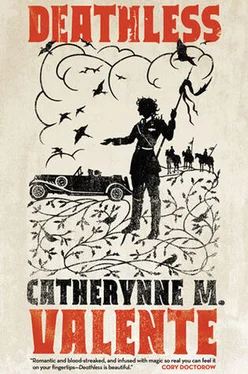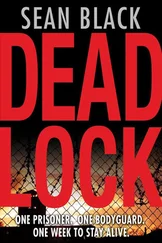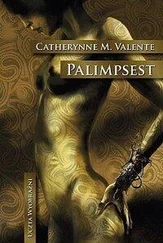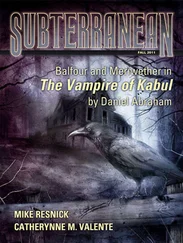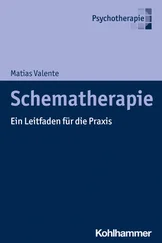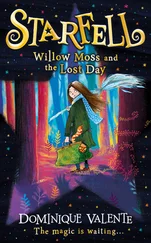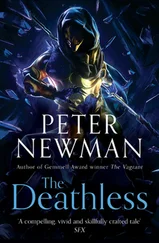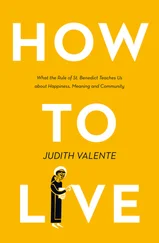And so Ivan strode expansively through the first falling leaves, taking tiny gulps of his cigarette to make it last. But the sweetness of cigarettes is, in part, that they spend themselves so fast. The young officer, with regret, but a chest full of richness, stomped out the last tiny nub of it into the frost.
A few feet away, under a bright scaffolding of golden leaves, Ivan Nikolayevich saw a man’s hand. The fingers had gone grey and bluish. The hand still clutched a scrap of last night’s snow. Ivan did not move, but followed the hand with his eyes, up to the wrist, the forearm, the shoulder, and finally the face of the dead man, lying in the forest, his eyes shallow and staring, his mouth open as though he had forgotten what he meant to say. He was not Russian—Ivan could be certain of that. The man wore a spangled, scarlet scarf around his head, and a row of steel earrings in his left ear, which had been half sawed off. His clothes glittered with ornament; his boots shone, a strange buttery green leather. Further, he still clung to his rifle, even in death, and Ivan Nikolayevich knew well that Russian dead never kept their rifles long. Ivan knew he ought to return to his camp at once and report the dead foreigner in the woods. Instead he took a few steps in his threadbare boots and prodded the corpse with his toe.
Maybe those boots will fit me, thought Ivan Nikolayevich. He could already feel their softness on his sore feet. Russian dead do not keep their boots long, either. I’ve a dog’s luck today! Butter, a good smoke, and new boots! But beyond the dead man lay another upturned hand, a woman’s, spattered with blood. Ivan shivered and shoved his hands deep in his pockets. Best to leave them. He could never explain the color to his comrades, anyway. But still, he inched forward, peering around a slim birch to see the face of the dead girl, her cheek well pecked by birds, one eye gone. She wore a wild scarf, too, yellow as the leaves, and on her forehead twisted two small horns, like a baby goat’s. Ivan hissed through his teeth and made the sign of the cross. It was a bad habit, crossing yourself, but like biting fingernails, hard to break.
As if they were bread crumbs, he followed the dead deeper into the wood. Sometimes a cluster of them lay fallen in a circle, back to back, having perished defending themselves. Sometimes they had died alone. Sometimes they had horns, like the woman in the yellow scarf. Sometimes they had tails. Sometimes they looked not very different from Ivan himself. Here and there the frozen ground glittered: splashes of something awful, like silver paint. There were so many of them. Ivan began to feel sick, and he regretted his precious butter. But he did not stop. How could there have been such a battle so near to his camp without one of the sentries raising the alarm for rifle fire? The wind kicked at the flaps of his grey coat. He longed for another cigarette to comfort himself.
Finally, the wood opened out onto a deep, stony valley clouded with brown leaves. Ivan Nikolayevich’s horror escaped his lips—he cried out, and fell to his knees. Thousands of dead littered the earth, their hands upturned, their eyes blind and flat, their beautiful clothes flapping in the breeze. A shrike cawed bitterly overhead, swooping in to yank on an eyelid, shaking his little black head to rip it free. Great gouts of the silver paint soaked the ground. Many of the fighters’ chests were sprayed with it. It had no smell. None of the dead smelled. Up on the next ridge of the valley a black tent stood, long, thin flags in red and white and gold snapping stiffly under low clouds.
Ivan shouted into the wind, “If any man remains alive here, let him answer! Who slew this great army?”
One soldier, near to him, coughed, blowing bubbles of blood from the corners of his mouth. Ivan Nikolayevich rushed to him, gave him water from his own flask. But the water just ran over his face, wetting it darkly, like silk. The soldier drew a ragged breath, and threads popped free in the corners of his lips. Ivan recoiled.
“All these dead belong to Marya Morevna, the queen from beyond the sea.”
And then the soldier died, with that name on his threadbare lips.
Ivan stumbled up toward the black tent, tripping over bodies, clutching his hat to his head. He knuckled tears from his eyes, moving like a mountain climber over their scarves, their spangles, their perfect boots. Don’t look down. Don’t look down.
No guards flanked the tent. Ivan Nikolayevich started as a silver-white thing moved in the corner of his eye. When he turned toward it, he saw only more dead, only more leaves. The tent shuddered.
“Screeeach,” croaked something neither the tent nor a soldier. Ivan whirled. It lumbered over the broken flotsam, teetering here and there over a crooked elbow, a twisted leg. Ivan could not tell if it was a man or a woman—its dark, hairy shoulders hunched up, hiding its head, and it creaked when it moved, like a weather vane. Ivan desperately longed to run, to move his strong legs, to take three rivers in a stride. Instead, he waited, his heart half-faint, until the thing stepped over a bony corpse and pulled up its head from deep in its chest.
It had a woman’s face, so perfectly young and beautiful that Ivan Nikolayevich hurt with the force of her gaze, his skin prickling to life. Her exquisite eyebrows arched over fierce blue-violet eyes, and her lips parted like a bride waiting to be kissed. But her dark hair snarled and matted like a bear’s, and she wore no clothes but bedraggled feathers, more like fur than down, hanging in clumps all the way from her huge, square, skeletal shoulders to her lizard-yellow, three-toed feet—a bird’s talons, clawing at the frozen ground.
“I’ve a dog’s luck today,” she barked, spittle flying. “Butter, a good smoke, and new boots!” The bird-woman chuckled as though she had made a quality joke. When her lovely mouth opened, Ivan could see that she had only three teeth, sunk in rickety white gums. She arched her back; her shoulders opened up into half-denuded wings. She flapped them twice, three times before settling, folding them down against her back. Ivan crossed himself again.
“Please, boy. What is that? You’re supposed to be through with God. Threw up your hands and called Him a lot of dirty names, what? Threw bricks through His windows! Personally, I have nothing against opiates or masses, but you had Him there. It’s a fair charge.” The bird-woman opened her mouth wide and screeeached again.
“You’re a devil!” cried Ivan Nikolayevich.
“Well spotted.”
Ivan tried to breathe more slowly. The cold sliced up his mouth. “God doesn’t exist only so long as devils also don’t exist,” he whispered. “Otherwise, the whole game is up.”
She lifted one leg, then put it down and lifted the other, rocking back and forth.
“Then up it goes, Ivan Nikolayevich.”
“How do you know my name?”
“Do you know, every time I have spoken to a human, I have been asked that? It’s almost a comfort. Almost endearing, how you look at me all big-eyed like that. I am the Gamayun, boy. I know everyone’s names. Of course, even if I didn’t, you’re always named Ivan Nikolayevich. It’s cheating, I admit. Not too much better than pulling an egg out of your ear.”
Ivan did not believe in God. Not really, the way he believed in breakfast, in butter, in cigarettes. Unlucky enough to have been born before the Revolution, he had been baptized and was prone to unfortunate lapses such as crossing himself. But Ivan knew that religious dogma served only to oppress the workers. He was proud of his clean mind, his modern thinking, which was free of all those holy, hollow promises.
Ivan Nikolayevich did not believe in God, but he did believe in the Gamayun. His mother had stopped reading the Bible to him as a good mother should, but she had never stopped telling stories around the stove, when winter hunkered down in the dark. Ivan could not remember her saying, Our Father who art in Heaven . But he recalled with a piercing clarity her face lit by the pitch-pine firelight as she whispered, The Gamayun eats from the bowl of the past and the present and the future, the bowl in which my Ivanushka is a baby, and a strong boy, and an old man with grandchildren. Here she comes, looking like a bird, but she is not a bird—creak, creak, creak!
Читать дальше
